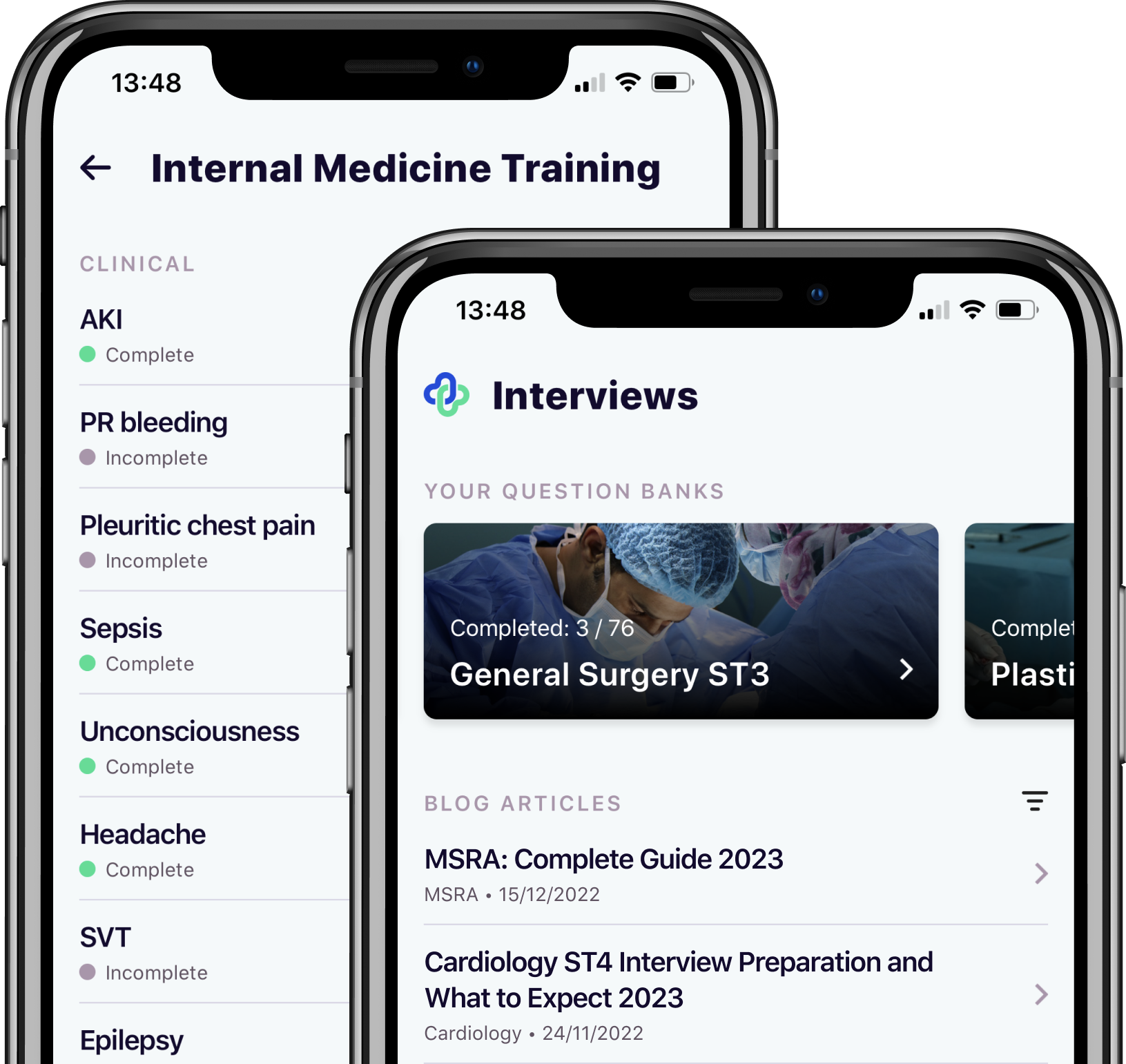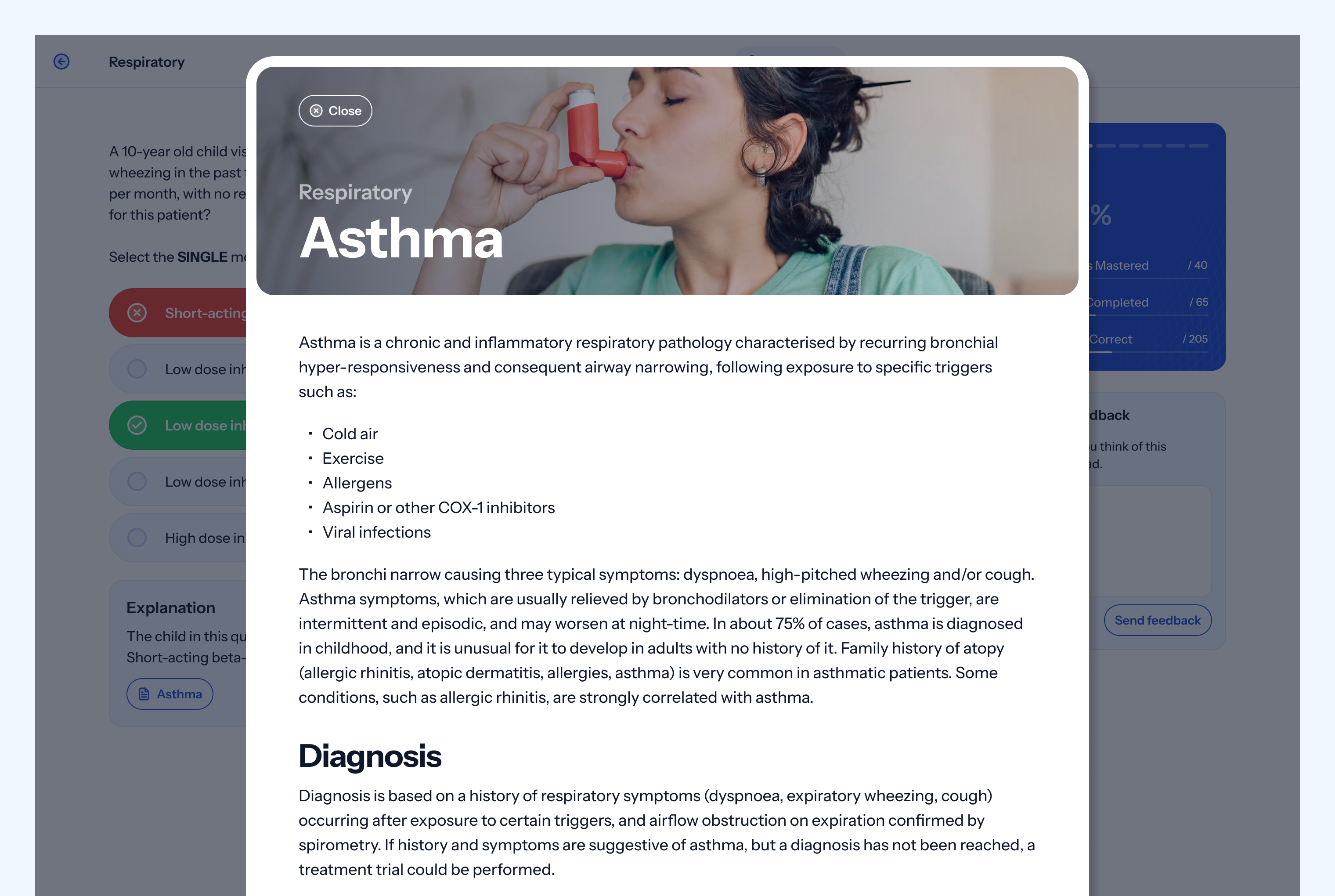
Medical Licensing Assessment (MLA) Exam: Complete Guide 2025
The Medical Licensing Assessment (MLA) is the new exam that has been introduced by the General Medical Council (GMC) from 2024 onwards. The MLA ensures that all doctors registered to practise in the UK have the knowledge, skills and behaviours needed for safe practice.
From 2024-25 onwards, all UK medical schools due to graduate are required to take the MLA. International medical graduates applying to practise in the UK will still be required to take the PLAB. However, in 2024, the PLAB became compliant with the requirements of the MLA, meaning the PLAB blueprint was replaced with the MLA content map. You can find out more about the MLA content map in the section below.
This guide will tell you everything you need to know about the MLA, including when you need to take the exam, the format of the MLA and how to prepare.
Do you need to take the MLA?
Our MLA AKT question bank and MLA CPSA question bank, designed specifically to match the exam syllabus, can help!
The MLA syllabus differs from old-style medical finals or the PLAB.
Ensure that any question bank provider you use hasn’t just changed the name of their old question bank. Medicine is vast, and you may waste considerable time revising topics not in the MLA.
All providers should be able to give you a breakdown of exactly how their question bank matches the MLA content map. Find ours here.
What is the MLA?
The GMC sets the standard for medical education and doctors working within the UK; all doctors working in the UK must be registered with the GMC and have a licence to practise.
The MLA has been designed as a standardised assessment for all doctors applying for a licence to practise medicine. It will ensure that those graduating in the UK and abroad meet the same standard for safe practice before they are licensed to practise.
Previously, medical schools chose their finals, and this inevitably meant there was variation across different universities, and those who qualified abroad were required to complete the PLAB which is an entirely different exam to UK students. The MLA provides a UK-wide threshold for safe practice in the UK.
What is the format of the MLA?
The exam is made up of two parts:
- Applied Knowledge Test (AKT): This is an on-screen, multiple-choice exam, made up of 200 single-best-answer (SBA) questions. It aims to assess your ability to apply medical knowledge to different scenarios.
- Clinical and Professional Skills Assessment (CPSA): This is a practical exam that involves demonstrating your clinical and professional skills in response to scenarios which you might encounter in clinical practice. You may hear the CPSA referred to as an Objective Structured Clinical Examination (OSCE) or Objective Structured Long Examination Record (OSLER).
If you’re studying at a UK university, both parts of the exam will be set and delivered by your medical school; although the GMC will set the requirements that all AKTs and CPSAs must meet. Alternatively, if you’re an international graduate applying to practise medicine in the UK, your MLA will be set by the General Medical Council (GMC).
MLA Content Map
The MLA content map sets out the knowledge, skills and behaviours required to practise medicine in the UK. Within this document, you will find the topics and areas that the AKT and CPSA assessments may cover.
The content map is based on the following key documents:
- The GMC’s Outcomes for Graduates – this sets out the knowledge and skills you must possess as a newly qualified doctor from a UK medical school.
- The GMC’s Generic Professional Capabilities Framework – this sets out the ‘essential generic capabilities needed for safe, effective and high-quality medical care in the UK’.
- Relevant parts of the UK Foundation Programme Curriculum and situations you will typically face during the UK Foundation Programme.
There are 3 overarching themes:
- Readiness for safe practice
- Managing uncertainty
- Delivering person-centred care
And six sections (called domains):
- Areas of clinical practice – for example, mental health and surgery.
- Areas of professional knowledge – for example, biomedical sciences and medical ethics and law.
- Clinical and professional capabilities – for example, assessing and managing risk, and safeguarding vulnerable patients.
- Practical skills and procedures – these are set out in the GMC’s Outcomes for Graduates.
- Patient presentations – this refers to the signs, symptoms, investigation results and other relevant patient-related issues typically seen by doctors in a first appointment within the UK Foundation Programme. The examples given are a chronic rash or breast lump.
- Conditions (pathophysiological diseases or clinical diagnoses) – again, this refers to those typically seen by doctors in a first appointment within the UK Foundation Programme. The examples given are asthma and eating disorders.
You can find more information, including a breakdown of the areas of clinical practice and professional knowledge, in the MLA content map.
MLA Exam Dates 2025
All UK medicine graduates will soon need to take the MLA.
All students graduating from UK medical schools in the academic year 2024–2025 and onwards will need to take the MLA as part of their medical degree, and you must pass before you can join the GMC medical register. The exam will be taken at your medical school and on dates chosen by them. Finals are normally taken anywhere from January – July in either the 4th or 5th year.
The most up-to-date information provided by the GMC states that international applicants who are currently required to take the PLAB will continue to do so and will not be required to sit the MLA. However, from 2024 onwards the PLAB blueprint was replaced by the MLA content map to make the exam compliant with the requirements of the MLA. The name is also expected to be “modernised” at some point, so you may find that it eventually becomes named the MLA. If you’re an international graduate applying to practise in the UK, you can find everything you need to know about how the introduction of the MLA will affect you in our PLAB and MLA blog.
Is MLA pass or fail and what score do I need?
Yes, the MLA is a pass or fail assessment. Students at UK medical schools will need to pass the exam in order to graduate and apply for a licence to practise medicine. Currently, we do not know what score you need to pass the MLA, however, we expect this to become more clear in the coming months as further information is released.
When will I get my MLA results?
Your results for both the AKT and CPSA sections of the MLA will be given to you by your medical school. The time in which you receive these after your exam will vary, and we recommend finding out the results policy for your specific medical school.
What happens if I fail the MLA?
The MLA exam is to be treated like any other part of your degree, and passing it is a requirement for graduating. The GMC states that they expect to “agree a maximum number of permitted attempts, and an appeals system for the AKT” however, this is yet to be released, and we recommend setting proficient time aside to prepare for your MLA exam to ensure you do not fall into this category. We will tell you a little bit more about our dedicated MLA question bank below, which you can use to help you prepare.
Will I have to pay for the MLA?
Students at UK medical schools will not be charged to take the MLA as their university will cover the cost of the exam. However, you may have to pay for any resits that you need to take.
Will the MLA be similar to PLAB?
The PLAB is the current exam some international medical graduates take when applying for a licence to practise medicine in the UK. You can find more information, including who is required to complete the exam, in our PLAB Guide.
Although there will undoubtedly be differences between the MLA and the PLAB – they’re different exams after all – there are similarities too, mainly:
- The exam is made up of two parts.
- The AKT (the first part of the MLA) and the PLAB 1 are both theory-based exams with multiple choice questions.
- The CPSA ( the second part of the MLA) and the PLAB 2 are both practical exams. For each, you’ll be given scenarios reflecting real-life settings and patient interactions.
- You need to pass the AKT before you can take the CPSA; the same rule applies for passing PLAB 1 before taking PLAB 2.
- The same number of resits are available – you can attempt the MLA and the PLAB up to 4 times.
And remember, although the PLAB is not changing to the MLA, the PLAB blueprint has been replaced with the MLA content map from 2024, so the exam will assess you against the MLA criteria rather than the current PLAB criteria.
MLA Preparation
Getting to grips with the MLA content map is the best place to start. This contains the knowledge, skills and behaviours you need to pass the exam.
The vast majority of people will prepare using this, their university notes, and online question banks.
The MLA content map can seem quite daunting, with a breakdown of the six ‘domains’ and an ‘A-Z of presentations’, it’s not the easiest document to revise from. That’s why we’ve created a brand new and totally comprehensive MLA question bank tailored specifically to the MLA content map. With over 4000 questions covering every MLA presentation and condition, we have designed it to make revising for the MLA simple and effective, and you can see how many questions we have for each condition here. We haven’t just rebranded our previous finals question bank; our question bank has been created solely for the MLA.
How to choose your MLA Question Bank
As mentioned above, the MLA content map details every area and presentation you could be assessed on. When you are choosing your question bank, look for one that has been mapped against this and that gives you the opportunity to practise answering questions covering all elements of the exam, to ensure that you’re as prepared as possible for any question you may encounter. Medicine is vast, and finals are tough, so you need to ensure you are revising exactly what you need to for the exam, and not spending hours revising topics that won’t come up.
A question bank which includes detailed explanations will also support your revision further, ensuring that you can learn from any mistakes you make and expand your knowledge across the MLA topics. Our MLA question bank provides a comprehensive overview of every topic, allowing you to learn about the relevant subject after each question, or to access it all in our ‘library’ to work through topics at your own pace.
How artificial intelligence technology can improve your MLA score
Our MLA AKT question bank uses our state-of-the-art AI technology to personalise your learning experience. Using machine learning algorithms, it continually assesses your strengths and weaknesses as you’re answering questions, and adapts based on your needs, giving you topics and questions most suited to further your learning. But what does this mean? You won’t spend time answering questions on topics you already know, and you won’t spend hours answering questions on topics you aren’t familiar with yet, the question bank will build you up to these. This ensures that your exam revision is focused on areas which will have the biggest impact on your progress, makes the most effective use of your time and helps maximise your MLA score.

Take your subscriptions with you
Our mobile app allows you to access your interview and exam question banks wherever you are.





